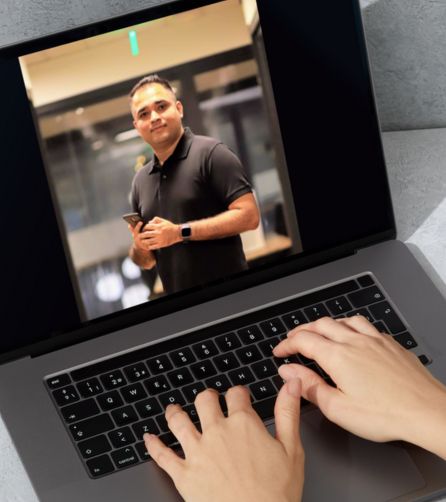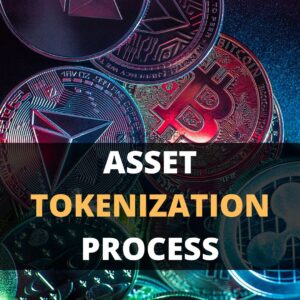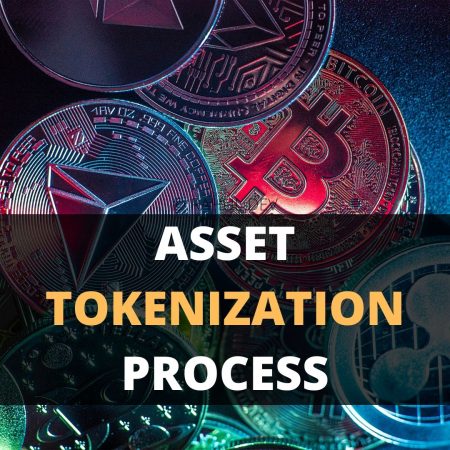Launching Tokenization Projects
Explore the Future of Asset Tokenization

Trust, Convenience and Innovation
Asset Tokenization on Blockchain

Explore the Future of Asset Tokenization

Asset Tokenization on Blockchain

Protect your innovations across multiple countries and create strong patent portfolio to boost business valuation
Local and global brand protection through international trademark registrations
Extensive research and business writing for technical whitepapers and B2B content products
The process of Asset Tokenization refers to depicting ownership of real-world assets as digital tokens using blockchain technology. To completely understand and execute the steps of asset tokenization process, asset tokenization companies need to adapt to latest best practices of tokenization. Essentially, this involves converting each aspect of a physical or real asset into a blockchain token, which can further be issued to potential investors and buyers as a tradeable digital token. This further requires maintaining ownership records of digital tokens on a decentralised ledger by following a specific set of tokenization rules and tokenization procedure. In use, asset tokenization companies and asset tokenization startupsaim to provide a digital investment vehicle to the investors and buyers of digital assets. The blockchain startups and blockchain companies implement the concept of Asset Tokenization on Blockchain as a stepping stone for revolutionizing the financial markets by offering increased liquidity, transparency, and efficiency. A complete understanding of asset tokenization process covers a thorough review of, blockchain technology basics, concepts of utility tokens, increasing value of utility tokens, legal due diligence of token projects, basics of asset tokenization, benefits of asset tokenization, and the step-by-step process to tokenize assets on a blockchain.
This article covers following topics:
How does Asset Tokenization Work?

With a view to understand the working of asset tokenization in financial technology or FinTech sector, it is important to review the mechanics of asset tokenization and examine how asset tokenization is revolutionary for businesses and investors. Essentially, the goal of asset tokenization is to converts physical asset into blockchain-based digital tokens by using distributed ledger technology to improve liquidity, transparency, and efficiency. This technical framework improves trust and accountability, making digital asset trading and management easier for investors and businesses. In use, the tokenizable assetsinclude, real estate assets, art assets, financial instruments, and intellectual property, almost any item can be tokenized. Blockchain technology allows many assets to be transformed into digital tokens, democratizing investment and market access. In the future, asset tokenization will be part of the financial environment as a norm.
In the rapidly evolving FinTech landscape of financial technology, the technological foundations of asset tokenization depend on the intricate role of blockchain and smart contracts. Basically, blockchain technology serves as the backbone of asset tokenization. Originating as the underlying technology for cryptocurrencies like Bitcoin, blockchain has evolved to offer a secure, transparent, and decentralized platform for a range of applications, including tokenization. Blockchain technology’s immutable ledger and consensus algorithmsensure the integrity and authenticity of transactions, making it an ideal choice for tokenizing assets.
As it is well known, smart contracts are self-executing contracts with the terms of the agreement directly written into code. These digital contracts operate on a blockchain network, automating the execution of predefined conditions. Smart contracts play a pivotal role in asset tokenization by automating various aspects of the process, from issuance of digital tokens to trading of digital tokens and legal compliance of digital token projects.
The synergy between blockchain and asset tokenization is undeniable. Blockchain technology facilitates the secure and efficient tokenization of assets, from real estate to intellectual property. The process involves converting these physical or financial assets into digital tokens, which can then be easily traded or transferred over a blockchain network.
Accordingly, smart contracts are integral to the asset tokenization process. They enable the automated issuance of tokens, enforce compliance rules, and facilitate secondary market trading. By embedding these smart contracts into the tokenization process, businesses aim to achieve greater efficiency, transparency, and security.
As blockchain technology continues to evolve, further advancements that will enhance the efficiency and security of asset tokenization. Innovations such as Layer 2 solutions and decentralized finance (DeFi) platforms are likely to play a significant role in shaping the future of this domain. The technological foundations of asset tokenization, particularly blockchain and smart contracts, are revolutionizing the way we perceive and handle digital assets. As we move towards a more digitized and decentralized financial ecosystem, understanding these technologies becomes imperative for business executives aiming to stay ahead of the curve.
A stablecoin project is the development and deployment of a digital currency that is pegged to the value of a stable asset, such as a specified quantity of a well-known fiat currency like the United States dollar. In the exciting sector of blockchain and cryptocurrency, this type of project is commonly known as a stablecoin. Stablecoins are digital currencies that aim to eliminate the price fluctuations that are normally associated with cryptocurrencies. As a result, their value is intended to be more consistent and easy to forecast.
The concept of asset tokenization is revolutionizing the way we manage and trade assets. By converting tangible and intangible assets into digital tokens, tokenization is improving asset management, supply chain optimization, and identity verification. Hence, several companies are pioneering innovative solutions to digitize physical assets and streamline transactions. These organizations are not only enhancing asset liquidity but also ensuring compliance with industry regulations.
For example, Tokeny Solutions specializes in private markets, wherein Tokeny Solutions leverages distributed ledger technology to offer financial actors a compliant way to issue, transfer, and manage securities, thereby enhancing asset liquidity. Similarly, LATOKEN is a fast-expanding crypto exchange with a focus on providing liquidity for emerging tokens. Beyond cryptocurrency trading, it offers Security Token Offerings (STO) and facilitates participation in selected token sales at various stages. With a commitment to industry and regulatory compliance, TokenEx offers organizations a secure, non-intrusive, and flexible tokenization solution. Also, CoreLedger delivers a decentralized, modular, and extensible operating system designed specifically for token economies.
Additionally, Blockchain App Factory provides a white-label asset tokenization platform, enabling issuers to create and manage digital assets effortlessly. Securitize is a compliance platform that specializes in the issuance and management of digital securities on the blockchain. On similar lines, Polymath is a security token platform that simplifies the creation, issuance, and management of security tokens. While Harbor offers a platform for the tokenization of private securities, including real estate assets. Similar to Harbor, Vertalo provides a platform designed for the tokenization of private securities, with a focus on real estate assets.
The applications of asset tokenization are as diverse as they are transformative. By enabling fractional ownership and improving asset liquidity, tokenization is redefining investment paradigms and democratizing access to various asset classes. Companies like Elevated Returns have successfully tokenized high-value real estate properties, such as the St. Regis Resort in Aspen, Colorado. This not only raised $18 million USD through a Security Token Offering (STO) but also democratized investment in real estate. Tokenization is also making inroads into the traditional credit card industry, with examples like Avios tokenizing loyalty points to enhance customer engagement and rewards. Also, the tokenization of intellectual property rights, such as patents and copyrights, allows for fractional ownership, thereby broadening the investor base and increasing liquidity. In the gaming industry, tokenization enables the creation of in-game assets that can be traded and exchanged, adding a new layer of engagement and monetization. Tokenization can further facilitate the fractional ownership of precious metals like gold and silver, making these assets more accessible to retail investors. The transformative power of asset tokenization is vividly illustrated in the real estate sector, wherein by enabling fractional ownership and improving liquidity, tokenization is revolutionizing real estate investment. The video provides a case study of a company that has successfully tokenized a real estate property, raising substantial funds through a Security Token Offering (STO).
Tokenization includes converting movable and immovable assets into digital tokens. As discussed herein, asset management, supply chain management, and identity verification are just a few of the use cases. Generally, tokenizing real estate assets can allow for fractional ownership, which makes it an investment that is more accessible and liquid than traditional real estate. Also, tokenizing collectibles and works of art can help stop fraud and guarantee that customers receive what they paid for. Both consumers and sellers benefit from tokenization of artwork assets. Similarly, tokenization can make precious metals fractionally owned, and wecurity tokens created through the STO process may be shares in the company.

As a business coach and thought leader, I cannot emphasize enough the importance of innovation, new software patents, mobile apps, and patents for tech companies, startups, and entrepreneurs. The world is rapidly evolving, and staying ahead of the curve is vital for success. Embracing technological advancements such as blockchain and AI can unlock unprecedented opportunities, streamline operations, and propel businesses into the future with competitive valuation via intangible assets.
Click Here for AI Startup Valuation Guide.
For instance, blockchain technology can revolutionize supply chain management and secure data sharing wherein innovative business models are explained to the audience via technical whitepapers, while AI can automate and optimize decision-making processes. Mobile apps are no longer just a luxury; they have become essential tools for engaging customers and offering personalized experiences. Furthermore, securing digital innovation patents is crucial for protecting intellectual property, fostering innovation, and maintaining a competitive edge. By investing in these areas, businesses can position themselves as industry pioneers and pave the way for a prosperous future after thoroughly conducting the due diligence and reviewing the legal opinion letters, which in case of digital assets can assist in determining the tokens as utility assets or coins as utility tokens before listing the assets at an exchange.
Our team of advanced patent attorneys assists clients with patent searches, drafting patent applications, and patent (intellectual property) agreements, including licensing and non-disclosure agreements. Advocate Rahul Dev is a Patent Attorney & International Business Lawyer practicing Technology, Intellectual Property & Corporate Laws. He is reachable at rd (at) patentbusinesslawyer (dot) com & @rdpatentlawyer on Twitter.
Quoted in and contributed to 50+ national & international publications (Bloomberg, FirstPost, SwissInfo, Outlook Money, Yahoo News, Times of India, Economic Times, Business Standard, Quartz, Global Legal Post, International Bar Association, LawAsia, BioSpectrum Asia, Digital News Asia, e27, Leaders Speak, Entrepreneur India, VCCircle, AutoTech).
Regularly invited to speak at international & national platforms (conferences, TV channels, seminars, corporate trainings, government workshops) on technology, patents, business strategy, legal developments, leadership & management.
Working closely with patent attorneys along with international law firms with significant experience with lawyers in Asia Pacific providing services to clients in US and Europe. Flagship services include international patent and trademark filings, patent services in India and global patent consulting services.
Global Blockchain Lawyers (www.GlobalBlockchainLawyers.com) is a digital platform to discuss legal issues, latest technology and legal developments, and applicable laws in the dynamic field of Digital Currency, Blockchain, Bitcoin, Cryptocurrency and raising capital through the sale of tokens or coins (ICO or Initial Coin Offerings).
Blockchain ecosystem in India is evolving at a rapid pace and a proactive legal approach is required by blockchain lawyers in India to understand the complex nature of applicable laws and regulations.